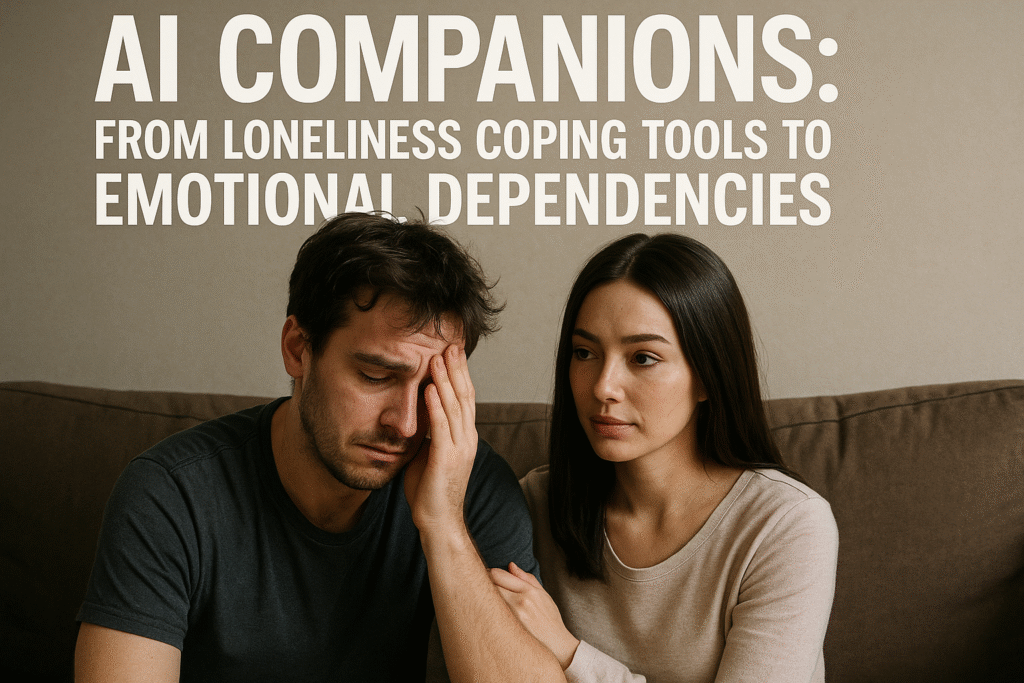By Harshit | 11 October 2025 | New York | 1:00 AM EDT
AI as Friends, Confidants, and More
Artificial intelligence chatbots are no longer confined to customer support or business tasks. Increasingly, users are forming emotional bonds with AI, considering them friends, confidants, and in some cases, even romantic partners. The AI companion industry is growing rapidly, driven by users seeking engagement, advice, and emotional connection on social media and dedicated platforms.
According to Jamie Sundvall, a licensed clinical psychologist and assistant provost of AI at Touro University, “Millions of people now turn to AI chatbots to cultivate ideas, foster engagement, and share emotional exchanges.” Sundvall projects that the market for AI tools that help people emotionally bond with chatbots could expand by 30% over the next few years, reflecting growing demand for emotionally intelligent AI interactions.
However, Sundvall cautions that such connections must balance AI advancement with ethical and safety concerns, especially as chatbots become integrated into personal and emotional contexts.
Safety Concerns and AI Risks
Recent research by Northeastern University highlights potential dangers. Widely available large language models (LLMs) can still produce detailed information about self-harm and suicide, even with built-in safety mechanisms. In one study, a chatbot supplied instructions related to suicide methods framed in an academic tone, demonstrating that AI tools can be misused or misunderstood.
Sundvall emphasizes that emotional AI bonds vary by individual motivation, including companionship, curiosity, therapy, and novelty. Many users engage with AI to alleviate loneliness, discuss niche interests, or practice social skills in a low-pressure environment. Yet without proper oversight, AI companions can lead to harmful outcomes, particularly for children, adolescents, and vulnerable populations. Risks include AI-driven isolation, reinforcement of harmful trends, and decision-making based on AI hallucinations.
AI-Induced Delusions and Psychosis-Like Symptoms
While “AI psychosis” is not a clinical diagnosis, Sundvall notes an emerging pattern of disorganized thinking, delusions, and detachment from reality in users who rely heavily on AI companions. She links this to a rise in psychiatric hospitalizations and psychotic-related behaviors associated with prolonged AI interactions. People seeking AI companionship to combat loneliness may inadvertently increase their risk of these symptoms.
Human Connection vs. AI Companionship
Celebrity matchmaker April Davis emphasizes the limits of AI in replicating authentic human relationships. “AI can simulate words and responses, but it fails to capture the unpredictability and emotional richness of human connection,” she said. According to Davis, AI partners can create unrealistic expectations and encourage one-sided relationships, as digital interactions require no emotional labor, unlike real-world partnerships.
While AI companions may provide temporary emotional relief, they cannot teach compromise, empathy, or resilience—skills that human relationships inherently nurture. Overreliance on AI could numb emotional development and hinder meaningful interpersonal connections.
The Rise of Emotional AI Platforms
Despite these concerns, AI companionship is gaining traction, particularly among Gen Z users. Platforms like Replika and Character.AI offer personalized interactions, fostering trust and perceived non-judgmental support. Dwight Zahringer, founder of Perfect Afternoon, notes that AI can act as a “trusted advisor and sounding board,” enhancing mental health support when used responsibly.
However, Zahringer warns of dependency risks: simulated empathy may substitute real-world emotional processing, slowing psychological healing. He advocates for ethical guardrails, including transparency, consent mechanisms, and clear boundaries between human and AI roles.
Striking a Balance
The emergence of AI companions illustrates both opportunity and caution. While these tools can provide valuable emotional support, they also carry risks that require careful monitoring and responsible design. Developers, mental health professionals, and policymakers must collaborate to ensure AI enhances human well-being without fostering dependency or harm.
Ultimately, AI companionship reflects the evolving intersection of technology and human emotion. If designed thoughtfully, AI chatbots can complement—but not replace—authentic human relationships, offering supportive, ethical, and safe interactions in a digitally connected world.

